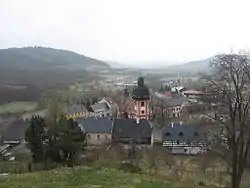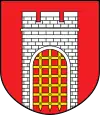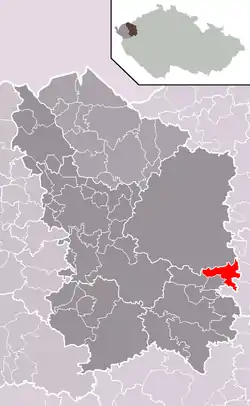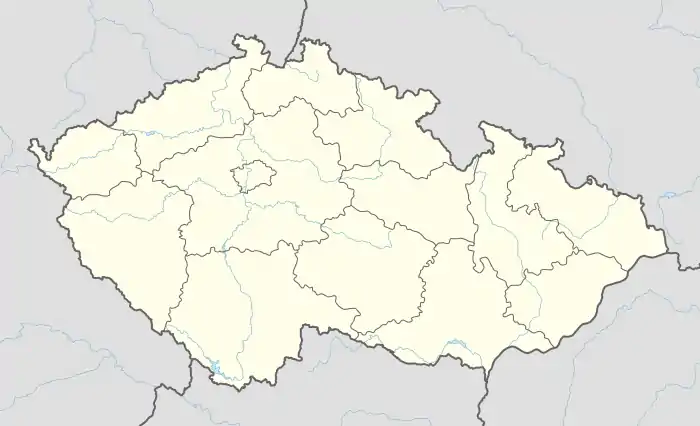Valeč (Karlovy Vary District)
The village of Valeč (German: Waltsch) is located in the Karlovy Vary district in the north-west of the Czech Republic. In 2006 there were 407 inhabitants, however according to the 2016 census the village had 346 inhabitants.[1]
Valeč | |
|---|---|
Municipality and village | |
 Valeč | |
 Coat of arms | |
 | |
 Valeč Location in the Czech Republic | |
| Coordinates: 50.1742°N 13.2522°E | |
| Country | |
| Region | Karlovy Vary Region |
| District | Karlovy Vary District |
| Government | |
| • Mayor | Aleš Kubísek |
| Area | |
| • Total | 6.61 sq mi (17.13 km2) |
| Elevation | 1,749 ft (533 m) |
| Population (2011) | |
| • Total | 375 |
| Time zone | UTC+1 (CET) |
| • Summer (DST) | UTC+2 (CEST) |
| Website | www |
History
The first written mention of the village dates from 1358, when it was confiscated during the war by the Citbor brothers and Benes.[2] Other owners of the estate during the Middle Ages: Zeman of Stebni, holding estates in nearby Ješek; Jan Hammer of Stebni 1368; Boreš of Oseka 1371; Beneš Buskovic from 1377 to 1416; and the masters of Doupov Nevlas and Jan 1416; Sezema of Doupov 1454; and Jan Doupov of 1487.
The village was given municipal rights December 1514, upon a request by Władysław II Jagiełło. In 1570 Christopher Štampach of Štampach bought Valeč. Václav Štampach of Štampach then built a Renaissance castle, whose appearance today is not known. After Václav Štampach joined the Estates Uprising and in 1622 left the country, the castle was confiscated. However in 1623, Valeč was bought by Barbora Štampachová of Poutnov.
The castle underwent significant change in the time of Prince Johann Christoph Kager at the turn of the 17th and 18th century. In this period, the Renaissance castle was converted to a square two-story baroque castle, led by architects Francesco Barelli, Antonio Bianno Rossa and after his death, John Christopher Tyll.[3] He also laid out the castle garden, equipped it with theater, cascading fountain and sculptures by the renowned Matthias Bernard Braun. Near the castle is the Church of the Holy Trinity built by architect GA Biana Rossou between the years 1710-1728. In its courtyard is also located the Holy Trinity Column by KM Kanka created in 1725 .
In the 18th century Valeč was occupied by Jan Ferdinand Kager of Globen beginning in 1721, and then Jan Antonín Pegen of Perga, the Czech Austrian Minister. Although he only owned it for a year, he heavily indebted the estate through costly remodeling.[2]
The castle underwent several modifications in the Neo-Renaissance and Neo-Baroque style. That is credited mainly to Earl Vincent de Thurn - Valssasin between 1895 and 1896. In 1937, Jan Larisch - Mönnich purchased Valeč, repairing the roof and cracks in the walls, and installing central heating. In 1945, based on the Beneš decrees, the palace was confiscated and handed over to the management of the organization of political prisoners. In 1947 the Ministry of Agriculture allocated it to the Central Directorate of State Forests and Farms and it was then used as a home for Korean children and from the early fifties as a children's home. After a fire on 2 April 1976, the regional conservation center in Plzeň took over management of the palace. Reconstruction of the building, began in the 1990s and continues to today.
References
- "Valeč, Stav obyvatel - statistika" (in Czech). Retrieved 9 April 2018.
- "Historie městečka" (in Czech). Retrieved 1 October 2014.
- "Stručná historie zámku Valeč" (in Czech). Retrieved 1 October 2014.
| Wikimedia Commons has media related to Valeč (Karlovy Vary District). |